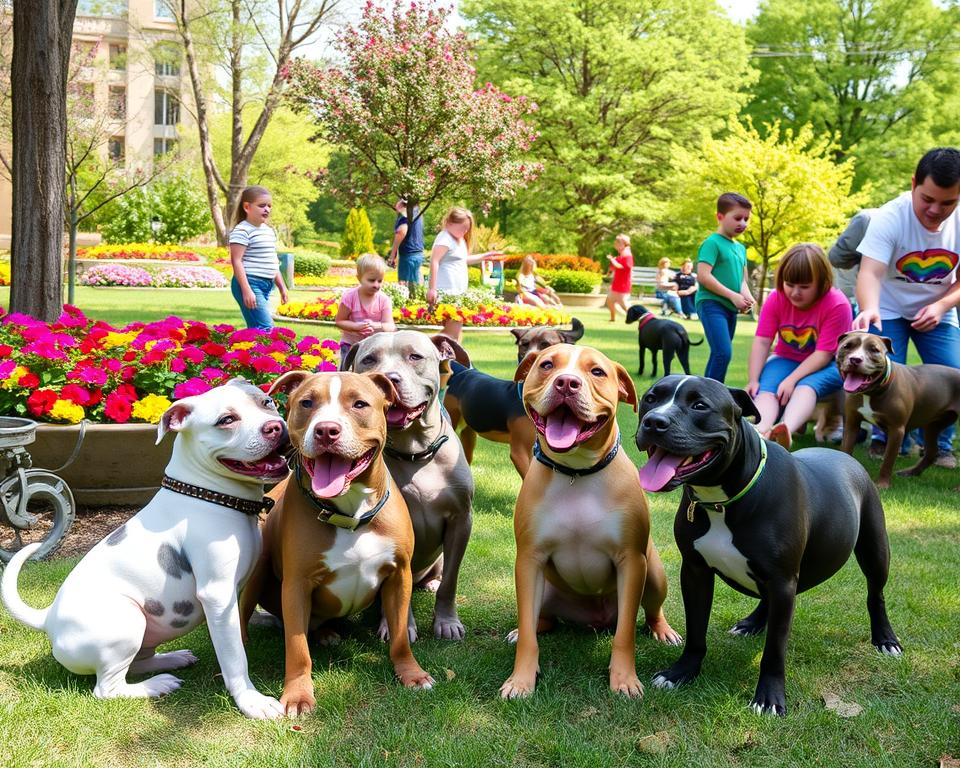How to Raise Pitbull Puppies in a Loving and Peaceful Environment
When a pitbull puppy looks up with trusting eyes, it’s a promise. You agree to raise them in a world filled with love, away from negative stereotypes. These pups, with playful tails and clumsy paws, start a beautiful journey in your home. And you have the power to shape their lives. It starts with choosing the best pitbull puppy breeder; the true magic is in how they grow with you.
Pitbull puppies are known for their stable temperaments, better than many breeds. However, despite their small numbers, many end up in shelters. It’s time to change the story. Early training takes advantage of their eagerness to learn, setting them up for a life of friendship.
It’s your job to show the world how great pitbulls are. Training should be fun and build a strong bond. A compassionate partnership will help break down old prejudices. Give your pitbull puppy a life filled with peace and love.
Table of Contents
Understanding the Foundations of Pitbull Puppy Training
Training your pitbull puppies is more than teaching them commands. It’s about creating a bond that lasts a lifetime. When you bring these puppies home, start their training right away. This early start is key to a fulfilling journey with them. Let’s dive into ensuring your training efforts are both successful and nurturing.
1. Building Trust: The Foundation of Raising Pitbull Puppies
Pitbull puppies, like all dogs, need to trust their owners to feel secure and happy. Building that trust begins the moment you bring them home, and it’s essential to maintain throughout their lives.
To start, focus on positive reinforcement. Reward your puppy with treats, toys, or affection when they show good behavior. Never use fear or punishment, as this can create anxiety and lead to behavioral issues down the road. Instead, be calm and consistent with your commands, ensuring they associate positive actions with rewards.
Step-by-step:
- Establish a routine: Dogs thrive on routine. Set regular times for feeding, walking, and training sessions.
- Use gentle commands: Start with basic commands like “sit” and “stay,” rewarding your puppy with treats when they obey.
- Practice patience: Pitbull puppies are eager to please, but they may not always get it right the first time. Be patient and consistent, and they will learn over time.
2. Socializing Pitbull Puppies: Creating Positive Experiences
Socialization is crucial for pitbull puppies, as it helps them learn how to interact with people, other dogs, and various environments. A well-socialized puppy grows into a calm and confident adult dog, less likely to develop fear-based aggression.
Begin socializing your pitbull puppies as early as possible, ideally by introducing them to different people, sounds, and situations in a controlled and positive manner. Expose them to children, other dogs, and new environments gradually to prevent them from feeling overwhelmed.
Step-by-step:
- Start at home: Introduce your puppy to household members first, ensuring they have positive experiences with each person.
- Gradually expand: Take your puppy on walks to expose them to new sights, sounds, and smells. Allow them to meet other dogs in a controlled environment, such as a puppy socialization class.
- Use positive reinforcement: Reward your puppy for calm and positive behavior during socialization experiences.
3. Training with Kindness: Setting Boundaries for Your Pitbull Puppy
Pitbull puppies are intelligent and eager to learn, which makes training an essential part of their development. Training with kindness and consistency helps create clear boundaries and teaches your puppy how to behave appropriately in various situations.
Avoid harsh discipline methods, as they can instill fear and lead to behavioral problems later. Instead, opt for positive reinforcement techniques, where good behavior is rewarded with treats, praise, or toys. Focus on basic obedience training at first, gradually introducing more complex commands as your puppy grows.
Step-by-step:
- Begin with basic commands: Start with simple commands like “sit,” “stay,” and “come.” Practice them daily.
- Keep sessions short: Puppies have short attention spans, so limit training sessions to 10-15 minutes at a time.
- Reward progress: Always reward your puppy when they follow commands or exhibit good behavior. This reinforces the behavior you want to see.
4. Exercise and Play: Keeping Your Pitbull Puppy Active and Healthy
Pitbull puppies are energetic and require plenty of physical activity to stay healthy and happy. Regular exercise not only helps them burn off energy but also reduces anxiety and behavioral issues caused by boredom.
Incorporate daily walks, playtime, and mental stimulation activities into your routine. Interactive toys, games like fetch, and even puzzle toys that challenge their minds are great ways to keep your puppy engaged.
Step-by-step:
- Daily walks: Take your pitbull puppy on at least two walks a day to keep them physically active.
- Interactive play: Play fetch, tug-of-war, or hide-and-seek to stimulate both their bodies and minds.
- Mental enrichment: Provide puzzle toys or training games to challenge your puppy’s mind and prevent boredom.
5. Creating a Calm Environment: Reducing Stress for Your Pitbull Puppy
A calm home environment is essential for pitbull puppies, as it helps them feel safe and secure. Chaos and loud noises can make puppies anxious, so it’s important to create a peaceful space for them to rest and relax.
Set up a designated area in your home where your puppy can retreat when they need quiet time. Ensure the area is comfortable, with a cozy bed and their favorite toys. Maintaining a calm and structured environment reduces stress and fosters a sense of safety.
Step-by-step:
- Create a puppy zone: Set up a quiet, cozy space in your home where your puppy can rest without distractions.
- Minimize loud noises: Keep the environment calm by avoiding loud music, TV, or sudden noises that might startle your puppy.
- Encourage relaxation: Provide chew toys or calming toys to help your puppy unwind and feel safe in their space.
Consistency is Key
For pitbull puppies, consistency is vital. Start training around 8 weeks old and maintain a regular schedule. Puppies love routine and knowing what behaviors get rewards. This approach isn’t just for commands like sit or stay. It applies to daily activities and how they interact with others too.
Positive Reinforcement Over Negative Punishment
Using treats, praises, or extra playtime works better than punishment. These positive methods build trust and security. And they encourage your xl pitbull puppies to keep up good behaviors. Positive reinforcement strengthens your bond and lays the groundwork for more advanced training.
Effective Timing in Training Regimen
Start training your xl pitbull puppies as soon as they settle in their new home. From 3-8 weeks old, teach them basic commands like ‘sit’, ‘down’, and ‘look’. Then, from weeks 8-12, start on more complex commands. Introduce them to ‘stay’, ‘come’, and how to walk nicely on a leash.
Creating a Structured Learning Environment
For successful pitbull puppy training, create a good learning space. Make sure it’s free from distractions and has lots of things to encourage learning. Adding games and puzzles can keep them interested and make learning fun. Don’t forget regular grooming, socializing, and consistent training. These are key for a well-behaved and happy pup.
Following these foundational principles means you’re not just training a puppy. You’re raising a well-disciplined, joyful, and healthy pitbull. They’ll be both a great joy and a faithful companion.
The Importance of Socialization for Pitbull Puppies
It’s essential to start socializing pitbull puppies early on. This includes blue nose and red nose pitbull puppies. Early socialization helps them become well-adjusted adults. It builds their confidence and teaches proper social behaviors.
Introducing Your Puppy to New People and Pets
Introducing your puppy to different people and animals is key. Start between 10 to 16 weeks of age. This is when they’re most open to new things. Having family and friends over can help. It makes your puppy more socially well-rounded.
Managing and Monitoring Playtime with Other Dogs
Watch your puppy closely during playtime with other dogs. This ensures playtime is safe and positive. Socialization classes are beneficial. They offer structured interactions with other dogs. Professionals there can also help with any issues that come up.
Creating Positive Experiences in Public Spaces
Take your pitbull puppy out to public places. This helps them get used to different environments. Go to parks, busy streets, and quiet neighborhoods. Use treats and praise to make these outings positive.
Handling Your Puppy’s Exposure to Different Environments
Expose your puppy to various environments gradually. Start with places that aren’t too busy. Slowly move to busier spots. Be consistent, but don’t rush it. Rushing can cause anxiety.
Following these steps will help your pitbull puppy grow into a sociable and confident dog.
Each step helps your puppy grow and strengthens your bond with them. It leads to a happy life together.

Raising Pitbull Puppies with Love and Patience
Raising pitbull puppies in a loving and peaceful way is all about patience, consistency, and understanding their unique needs. By focusing on positive reinforcement, socialization, and creating a calm environment, you’ll help your pitbull puppy grow into a well-adjusted, confident adult dog.
With love, care, and the right techniques, your pitbull puppy will thrive in a peaceful environment and develop into a loyal companion. Remember, every moment you invest in their growth is rewarded with a lifetime of love and loyalty from your furry friend. Embrace the journey, and enjoy the incredible bond you’ll build along the way.
Visit https://europe2flow.com/ to stay tuned for other useful Hints & Tips.
Source Links
- Tips for Pit Bull Owners
- Complete Guide on How to Train a Pitbull Puppy – Bully Max
- Everything You Need to Know About Taking Care of Pitbull Puppies
- Complete Guide on How to Train a Pitbull Puppy – Bully Max
- Training A Pitbull Puppy: Expert Tips for a Well-Behaved Pooch
- How to Train Your Pit Bull — Tully’s Training
- How to Socialize a Pit Bull Puppy: Wrong & Right Ways
- Training A Pitbull Puppy: Expert Tips for a Well-Behaved Pooch
- About Bully Breeds
- Pit Bull Head Growth Stages: From Playful Puppies to Majestic Maturity
- You’re Probably Wrong About Pitbulls
- The Comprehensive Guide to Raising Pitbull Puppies
